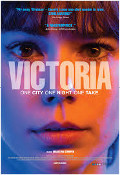
Directed by
Sebastian Schipper
138 minutes
Rated MA
Reviewed by
Chris Thompson

Victoria
Synopsis: In the wee small hours of a Berlin night, Spanish girl Victoria (Laia Costa) meets Sonne (Frederick Lau). Boxer (Franz Rogowski), Blinker (BurakYigit) and Fuß (Max Mauff) – four German friends celebrating a birthday. What begins as a fun and romantic night soon turns dark and threatening as Victoria become caught up in the Berlin underworld.
It’s hard not to wonder whether the idea for this film came to Sebastian Schipper when he worked as an actor in Tom Twyker’s 1999 thriller Run Lola Run. There are some similarities between the two films; each with the compressed and pressured timeline of their narratives playing out in the seedy underworld of Berlin. But Schipper plays with time in an entirely different way here than Twyker did in Lola.
The astounding technical achievement of Victoria is both its strength and its weakness. It’s a single shot that lasts for almost two-and-a-half hours as the story shifts from nightclub to rooftop to underground garage to café and then eighteen other locations within a couple of city blocks of Berlin lasting from the low light states of late night to the more natural lighting of dawn and early morning. You can’t help but be in awe of the logistics and choreography that must have gone into it (apparently they needed three completely separate sound crews), let alone the virtuosic craft (not to mention the stamina) of Norwegian cinematographer, Sturla Brandth Grøvlen, who so expertly captures the uninterrupted, unfolding action.
The trouble is that once it shifts gear into the thriller genre it becomes hard to maintain the tension when every time they have to get in the car and drive from one place to the next they actually have to drive for the time it takes to get there. Schipper and co-writers Olivia Neergaard-Holm and Eike Frederik Schulz do their best to cover these transitions with snappy dialogue and character moments but the demands of real-time take their toll after a while and end up diverting pace from what should have been a taut and edgy thriller.
The single shot concept is not a new idea. Hitchcock did it (well, more or less, allowing for strategic cuts to change rolls of film) in 1948 with Rope and Alexander Sokurov did it again in 2002 with Russian Ark. As recently as last year we saw Alejandro González Iñárritu use the style of a single shot film in Birdman or (The Unexpected Virtue of Ignorance) but he (wisely) recognised the need to cut now and then to move the action on. In Victoria, Schipper outdoes all his predecessors but seems willing to sacrifice some of the audience experience to do so.
That said, Costa gives an outstanding performance in the title role. She’s sweet and vulnerable but ultimately self-sufficient and sure of herself. Lau too gives a strong performance as the charming love interest who finds himself torn between his attraction to Victoria and loyalty to his best friend, Boxer. It’s this conflict that lies at the heart of the story. The two of them, along with the rest of this small ensemble, manage to sustain their compelling performances from go to whoa – something we’re used to with stage actors but not so much on the big screen. Unfortunately, the challenging style means that the film isn’t able to sustain itself to the same extent.

Want more about this film?


Want something different?




